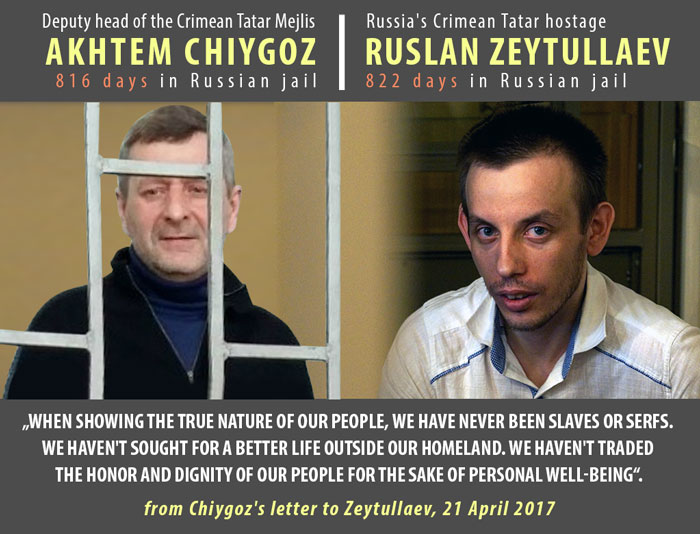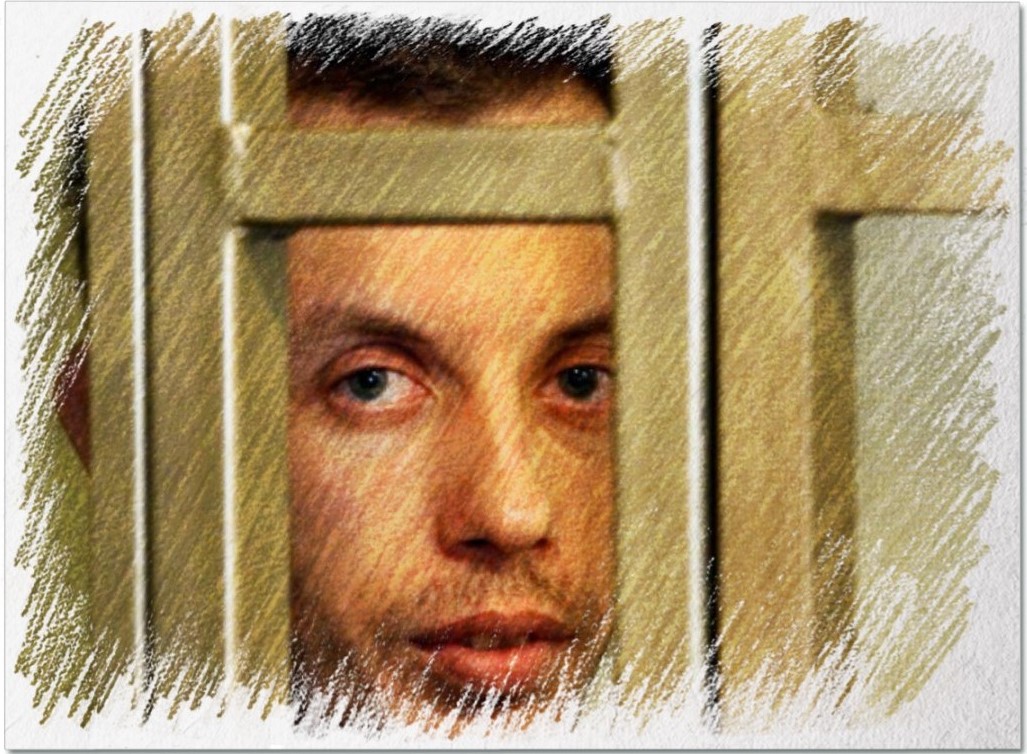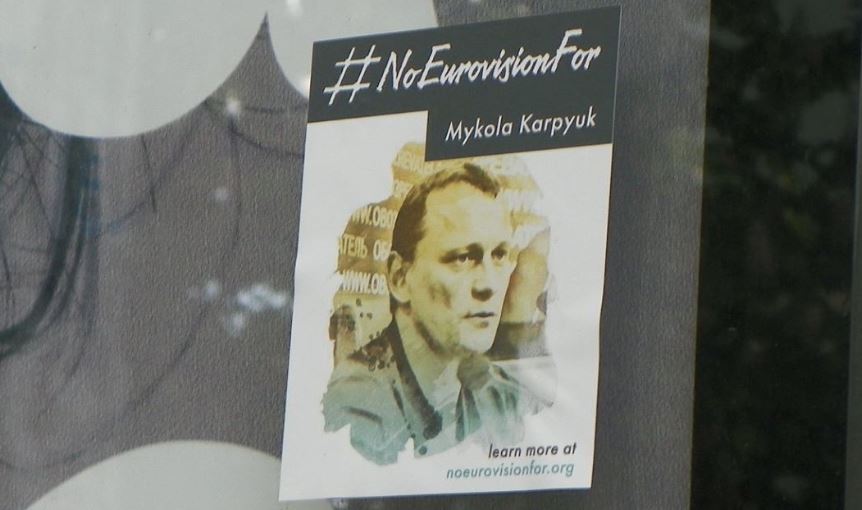For three weeks prior to the second sentence, Ruslan was on hunger strike protesting against the state terror Russia brought to Crimea.
He is one of at least 42 Ukrainian citizens who are now held in custody by the Russian regime as political hostages.
Watch: Why is the Kremlin taking Ukrainian political hostages? | VIDEO
So who is he?
Ruslan is a 31-y.o. construction worker from the Russian-occupied city of Sevastopol in the south of the Crimean peninsula. He is a practicing Muslim and was an active member of a local Muslim community before his arrest. Russian investigative authorities treat his outlook as a thoughtcrime that should be punished under the criminal article on “terrorism.”
Read more: Imaginary “terrorists” with no terror acts: Russia’s collective punishment of Crimean Muslims
Ruslan has a wife and three little daughters, the eldest of whom is only seven.
Why did Russian law enforcers target Zeytullaev?
A few years before the annexation of Crimea, Ruslan quarreled about a land parcel with a person who would later, in 2014, become an officer of the Russian Federal Security Service. This person authored a false denunciation of Zeytullaev out of personal animosity. This denunciation triggered the whole case.
Russia’s further investigation of the case was done in line with its strategy of intimidation and oppression of Crimea’s native people, the Crimean Tatars, who predominantly did not want to bow to the occupation regime. Almost simultaneously with Ruslan, in January 2015, Russian security officers arrested the deputy head of the Crimean Tatar Mejlis Akhtem Chiygoz: he was charged in the case of a pro-Ukrainian rally in Simferopol, which occurred even before Russia annexed Crimea.

Read also: Remember the Crimean Tatars jailed for resisting Russian occupation
Did the Russian court in Rostov have a legitimate authority to judge Ruslan?
No. UN General Assembly resolution 71/205 adopted in December 2016 recognizes Russia as the occupying power in the Autonomous Republic of Crimea and the city of Sevastopol, hence the respective obligations under the 1949 Geneva Convention apply to her.
According to the Convention, the criminal legislation previously in force in a certain territory remains valid in case of its foreign occupation. Additional regulations may be introduced by the occupying power only when absolutely necessary and enter into force only after they are published and made accessible to the local population in its language.
Russian prosecution charged Zeytullaev with the involvement in the Islamic organization Hizb ut-Tahrir, which was and is legal under Ukrainian law. Since 2014, Crimea’s occupation authorities have not announced any new official regulations, particularly in the Crimean Tatar language, that would outlaw this organization. Instead, they de facto substituted the Russian legal space for the Ukrainian one and therefore consider the dubious ban of Hizb ut-Tahrir imposed by the Russian Supreme Court in 2003 applicable to the occupied peninsula. This is a blatant violation of the Geneva Convention.
Moreover, the Convention provides that the residents of an occupied territory can only be tried by the courts working in this territory. Russia transported Ruslan Zeytullaev outside Crimea against his will and put him before the Rostov court, which had no jurisdiction to consider his case.
Did Russia prove his activities to be dangerous for society?
No. The prosecution did not even intend to do this. Its goal was just to “prove” Ruslan’s alleged role as an organizer of a local Hizb ut-Tahrir cell in Sevastopol. The “evidence” was a secret recording of Ruslan’s private conversation on various issues of politics and religion. This recording included nothing either proving that such a cell ever existed or indicating that Zeytullaev was its organizer or member.
Why did he keep his hunger strike for so long?
Despite their international obligations, Russian authorities denied Ukrainian consuls access to the Ukrainian citizen Zeytullaev in Rostov-on-Don. On April 4, Ruslan announced a termless hunger strike demanding a meeting with the consul, as well as the transfer of all unfairly convicted Crimean Tatars to Ukraine and the end of persecution on ethnic and religious grounds in occupied Crimea.
With risk to his health, Ruslan spent 22 days without food. However, none of his demands were satisfied. He only stopped the strike on the day of the verdict, after Crimean Tatar leaders Mustafa Dzhemilev and Ilmi Umerov, along with lawyers and dozens of convened supporters, asked him to spare his life.
[youtube https://www.youtube.com/watch?v=09PvAeg9Xag]
How do respected human rights watchdogs treat the nature of his persecution?
The Russian Memorial Human Rights Center recognized Ruslan Zeytullaev as a political prisoner.
A number of reputable organizations, including Human Rights Watch and Amnesty International, argue that involvement in Hizb ut-Tahrir, even if proven, is by no means a sufficient basis for the charge of “terrorism.” Members of Hizb ut-Tahrir, experts emphasize, have never been sentenced for preparing or committing a terrorist attack for more than sixty years of its existence in any country of the world.
Is there hope to make Russia release Zeytullaev after his conviction?
The Kremlin does not treat the sentences passed by its puppet judges seriously. President Putin considers the Ukrainian citizens imprisoned in Russia and Crimea as hostages and commodities he is willing to trade.
Almost a year ago, the firm stance of the international community forced Putin to release and return home three Ukrainians illegally convicted in the Russian Federation. This means that the other political prisoners, including Ruslan Zeytullaev, also can be and should be liberated as a result of the strong and consolidated pressure on Moscow.





